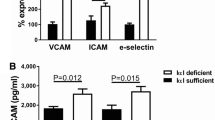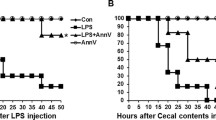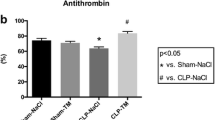Abstract.
Objective and design: Non-anticoagulant biological activities, such as anti-inflammatory and anti-apoptotic mechanisms of action, have been suggested for recombinant human activated protein C (rhAPC; drotrecogin alfa (activated)). However, these mechanisms are much less characterized and understood than rhAPC’s anticoagulant activity. Aim of the study was to determine the effect of rhAPC on the activity of the pro-inflammatory transcription factor nuclear factor kappa B (NF-κB) in mononuclear cells isolated from septic patients and to characterize an effect downstream from NF-κB activation, such as the release of the NF-κB-controlled chemokine Macrophage Inflammatory Protein-1-alpha (MIP-1-α).
Subjects: Peripheral blood was obtained from 13 septic patients and from 8 healthy controls.
Methods: Mononuclear cells were isolated by Ficoll-Paque density gradient centrifugation and were incubated with or without rhAPC (10 μg/ml) for 2 h for the measurement of NF-κB activity in cell lysates or alternatively for 6 h for the determination of MIP-1-α levels in supernatants. NF-κB activity was measured by an ELISA-based assay directed against the p50 and the p65 subunit of NF-κB.
Results: RhAPC, at supra-pharmacological concentration (10 μg/ml), significantly inhibited NF-κB activity and the release of MIP-1-α ex vivo in isolated mononuclear cells from patients with severe sepsis. In mononuclear cells of healthy subjects, however, rhAPC did not change NF-κB activity. Basal NF-κB activity early in severe sepsis was not predictive for survival.
Conclusions: RhAPC at supra-pharmacological concentration (10 μg/ml) inhibits the activity of NF-κB in ex vivo isolated mononuclear cells of septic patients as well as the release of MIP-1-α, a proinflammatory chemokine regulated by NF-κB. These findings may represent immunomodulatory pathways by which rhAPC exerts specific anti-inflammatory activity in vitro in addition to its known anticoagulant and profibrinolytic activity and should be further investigated in an in vivo setting.
Similar content being viewed by others
Abbreviations
- APACHE:
-
Acute physiology and chronic health evaluation
- CRP:
-
C-reactive protein
- ELISA:
-
Enzyme-linked immunosorbent assay
- IL-1β:
-
Interleukin-1β
- IL-6:
-
Interleukin-6
- IL-8:
-
Interleukin-8
- LPS:
-
Lipopolysaccharide
- MIP-1-α:
-
Macrophage inflammatory protein-1 alpha
- NF-κB:
-
Nuclear factor kappa B
- p50/p65:
-
subunits of nuclear factor kappa B
- PROWESS:
-
Protein C worldwide evaluation in severe sepsis
- TNF-α:
-
Tumor necrosis factor-alpha
- RhAPC:
-
Recombinant human activated protein C
Author information
Authors and Affiliations
Corresponding author
Additional information
Received 20 March 2004; returned for revision 5 April 2004; accepted by M. J. Parnham 5 May 2004
M. Brueckmann and U. Hoffmann contributed equally to this study.
This work was supported by a grant of the Faculty of Clinical Medicine Mannheim, University of Heidelberg, Germany, and an unrestricted research grant by Lilly, Germany.
Rights and permissions
About this article
Cite this article
Brueckmann, M., Hoffmann, U., Dvortsak, E. et al. Drotrecogin alfa (activated) inhibits NF-kappa B activation and MIP-1-alpha release from isolated mononuclear cells of patients with severe sepsis. Inflamm. res. 53, 528–533 (2004). https://doi.org/10.1007/s00011-004-1291-z
Issue Date:
DOI: https://doi.org/10.1007/s00011-004-1291-z




